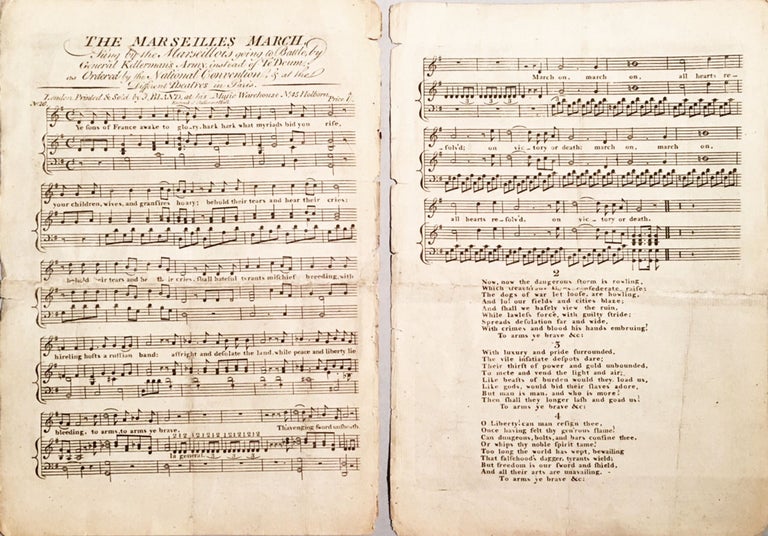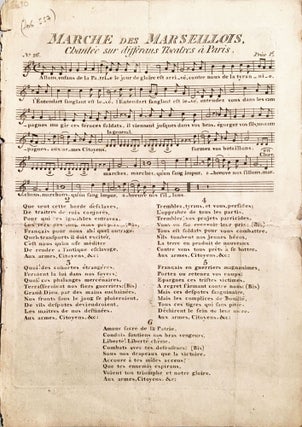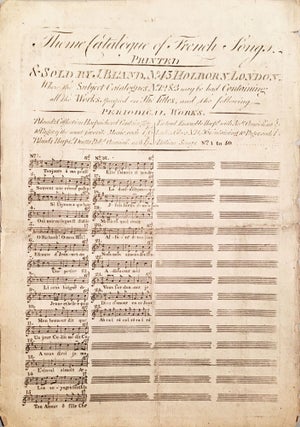Marche des Marseillois, Chantée sur differans Theatres à Paris. The Marseilles March, Sung by the Marseillois going to Battle, by General Kellerman’s Army, instead of Te Deum, as Ordered by the National Convention, & at the Different Theaters in Paris. Theme Catalogue of French Songs.
Folio [33.0 x 23.2 cm], (2) ff. engraved sheet music. Unbound, originally a conjoined leaf, mends to old folds affecting a few letters but not legibility, minor edge wear. Housed in a custom made portfolio. Rare first edition, first issue, of the first English-language version of “La Marseillaise,” published in London by the music-seller John Bland (active 1776-c.1794) barely six months after the famous French march was first composed (on a single night in April of 1792) and some three years before the song was officially adopted as the national anthem of France (on 14 July 1795). This 2-sheet engraved score includes one page of the original French song, two pages with the music set to English lyrics, and a final page given to Bland’s “Theme Catalogue of French Songs” (an advertisement listing the initial lyrics and music of 25 songs available for purchase at Bland’s shop on Holborn Street). Bland notes that “La Marseillaise” march was “Sung by the Marseillois going to Battle, by General Kellerman’s Army, instead of Te Deum, as Ordered by the National Convention, & at the Different Theaters in Paris”: Here he refers at once to the use of the song by General François Christophe de Kellermann (1735-1820) at the Battle of Valmy (20 September 1792) and to the meteoric rise of the march’s popularity among the French public. Within a month of the Battle of Valmy, Bland had officially registered the present score at Stationers’ Hall in London, on 23 October 1792 (see, K. Kassler, p. 184), and it is likely that this (undated) piece was printed immediately thereafter (priced at 1 shilling). (Musical scores were not in this period required by law to be dated, but Kassler’s recent research on musical entries at Stationers’ Hall reveals that the present Bland score was the only English version of “La Marseillaise” officially registered in 1792-93). The English lyrics printed here differ considerably from the versions typically encountered today, being less a translation of the French than a new rendition in the spirit of the original. The author of this English version remains unknown. “La Marseillaise,” later ratified as the French national anthem, was composed in one night (April 25, 1792) by Claude-Joseph Rouget de Lisle (1760-1836), an army engineer and amateur musician garrisoned in Strasbourg. It was played at a patriotic banquet at Marseilles, and printed copies were distributed in July to the revolutionary forces marching on Paris (the French lyrics first appeared in print in the 23 June edition of the Journal des départemens méridionaux). Troops entered Paris singing this song, marching to the Tuileries on 10 August. Rouget de Lisle was himself, however, a royalist, and he refused to take the oath of allegiance to the new constitution. He was imprisoned, barely escaping the guillotine. Originally entitled “Chant de guerre de l’armeé du Rhin” (“War Song of the Army of the Rhine”), the anthem quickly became called “La Marseillaise” because of its popularity with volunteer army units from Marseilles. It became the French national anthem in a decree passed July 14, 1795. The song was banned by Napoleon during the Empire, and by Louis XVIII on the Second Restoration (1815), because of its revolutionary associations. Authorized after the July Revolution of 1830, it was again banned by Napoleon III and not reinstated until 1879. Bland’s “Theme Catalogue of French Songs” appears on the final page of the document and offers a clue concerning the state of this edition. The musicologist A. L. An, writing on the phenomenon of such theme catalogue advertisements in the late 18th-century London music trade, notes that, “Bland … provides us with the earliest examples of the ‘growing’ thematic catalogues. ‘Theme Catalogue of French Songs’ is seen in a single state [emphasis mine], containing 26 items, but has 34 blank staves for the further additions, a sure sign that the catalogue was intended for expansion” (Y. L. An, p. 81). Intriguingly, the present example of the “Theme Catalogue of French Songs” does not have “La Marseillaise” as item no. 26, as called for by An and others, but instead has a blank staff, suggesting that this impression of the “Theme Catalogue of French Songs,” to which “La Marseillaise” had not yet been added, is indeed in its true first state showing only 25 songs. It thus can be inferred that the French and English versions of “La Marseillaise” preceding it are also in the first state issued from Bland’s press. A similarly titled version (also undated on the plate and also very rare) of this English rendition was published by Bland’s rivals Longman & Broderip, but their publication was not entered into the records at Stationers’ Hall (see Kassler, pp. 168-215), and so perhaps represents a pirated version of the present Bland sheets or a copy which appeared as the song began to proliferate more widely in London afterwards (see Notes and Queries for a discussion concerning the primacy of these editions). John Bland’s copperplates for this printing apparently survived after his death/retirement in c. 1794 and were reprinted by Bland & Weller, who were operating from 23 Oxford Street by June of 1794. The present document would also seem to be a very early witness to the printing of the French original of “La Marseillaise” in England. Apart from this Bland score, the earliest firmly dated French-language edition printed in England is a broadside headed with a lively scene of marching soldiers by the caricaturist Richard Newton (1777-98) (with the imprint “London Pub. Nov.r 10, 1792, by Will.m Holland, No. 50, Oxford St.,” i.e., nearly 3 weeks after Bland’s entry at the Stationers’ Hall); because it carried an etched image, the Newton/Holland broadside was apparently considered to be more a print than music, and thus was required by law to be dated in the copperplate (see King, pp 1-2). OCLC locate U.S. copies of the present Bland edition at the Morgan Library (erroneously catalogued as ‘c. 1794’) and BYU (erroneously catalogued as ‘c. 180?’). The Bland & Weller reprint is held at Harvard (catalogued as ‘c. 1795’). The Longman & Broderip version is at Harvard Houghton, Harvard Loeb Music, NYPL, and Yale Music. * M. Kassler, Music Entries at Stationers’ Hall, 1710-1818, p. 184; Y. L. An, Music Publishing in London from 1780 to 1837 as Reflected in Music Publishers’ Catalogues of Music for Sale: A Bibliography and Commentary, no. BlJ15, pp. 90-1; I. Woodfield, “John Bland: London Retailer of the Music of Haydn and Mozart, Music & Letters, vol. 81, no. 2 (2000), pp. 210-44; Notes and Queries, vol. X (16 January 1909), p. 51; Notes and Queries, vol. X (30 January 1909), p. 92; A. H. King, “The First Illustrated and Dated Edition of the Marseillaise,” The British Museum Quarterly, vol. 20, No. 1 (1955), pp. 1-2.
Price: $2,450.00



